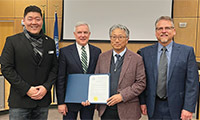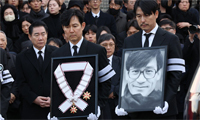
Senator John McCain, left, has been a close ally of President Bush’s, but he is positioning himself an opponent of the political establishment.
By PETER BAKERST. PAUL - The nominee’s friend described him as a “restless reformer who will clean up Washington.” His defeated rival described him going to the capital to “drain that swamp.” His running mate described their mission as “change, the goal we share.” And that was at the incumbent party’s convention.
After watching two political conclaves recently, it would be easy to be confused about which was really the gathering of the opposition. As Senator John McCain accepted the Republican nomination for president, he and his supporters sounded the call of insurgents seeking to topple the establishment, even though their party heads the establishment.
This was, of course, part Mr. McCain’s nature and part political calculation. It was also part history.
For the first time since 1952, the party holding the White House has nominated someone other than the sitting president or vice president, someone without a vested interest in running on continuity, and at a moment when the party finds it difficult to defend its record from the last eight years.
The effort to position Mr. McCain and the Republicans as the true agents of change benefited from his selection of Governor Sarah Palin of Alaska as his running mate.
Known for taking on her own state party over corruption and wasteful spending, Ms. Palin projects the image of the ultimate Washington outsider, literally from more than 4,500 kilometers outside the Capital Beltway. And she would be the first woman to serve as vice president.
But as a matter of history, it is easier to run as the opposition party if you actually are the opposition party.
“When the president of the United States is from your own party, to present yourself as a change agent is not the easiest thing to pull off,” said Joe Trippi, a Democratic strategist. Referring to Senator Barack Obama, the Democratic nominee, Mr. Trippi added, “All Obama has to do is say, ‘Bush-McCain, Bush-McCain.’”
That was certainly a chant never heard during the Republican convention in the Xcel Energy Center here.
President Bush canceled his trip here to supervise the response to Hurricane Gustav and addressed delegates only by video, before the broadcast networks began their coverage for the night.
Once his image faded from the screen, none of the marquee speakers for the rest of the convention mentioned his name during the nightly prime hour. Indeed, a computer count showed that Democrats mentioned the name Bush 12 times as often at their convention. And delegates were shown a video about the attacks of September 11, 2001, that included a picture of Rudolph W. Giuliani and Donald H. Rumsfeld but none of Mr. Bush . Republicans said Mr. McCain had little choice.
For “every candidate, regardless of whether they’re an incumbent or a challenger,” said Sara Taylor, a former White House political director under Mr. Bush, “one of the fundamental missions is how to set themselves up as the change agent, and John McCain is well equipped based on a long record as a maverick to do that.”
And it is true that even vice presidents running as popular presidents leave office have labored to establish their own identities. “Conventions are always about the next four years, not the last four or eight years,” said Ron Kaufman, who was a top aide to the first President Bush. “In the end, whether your party is in power or not, it’s about, ‘What are you going to do for me for the next four years?’”
Still, even though the elder Mr. Bush wanted to slip out of Ronald Reagan’s shadow in 1988 and Al Gore tried to distance himself from the scandals of Bill Clinton in 2000, they both used their acceptance speeches to boast of their administrations’ records.
By the time the convention here was about to begin, Mr. McCain almost sounded like a speaker at an Obama rally. “I promise you, if you’re sick and tired of the way Washington operates, you only need to be patient for a couple of more months,” he told supporters in O’Fallon, Missouri. “Change is coming! Change is coming! Change is coming!”
Mr. McCain has been a strong supporter of Mr. Bush’s. And the Obama campaign signaled it would not cede the change argument, airing another advertisement showing him with Mr. Bush and concluding: “We can’t afford four more years of the same.”
스마터리빙
more [ 건강]
[ 건강]이제 혈관 건강도 챙기자!
[현대해운]우리 눈에 보이지 않기 때문에 혈관 건강을 챙기는 것은 결코 쉽지 않은데요. 여러분은 혈관 건강을 유지하기 위해 어떤 노력을 하시나요?
 [ 건강]
[ 건강]내 몸이 건강해지는 과일궁합
 [ 라이프]
[ 라이프]벌레야 물럿거라! 천연 해충제 만들기
 [ 건강]
[ 건강]혈압 낮추는데 좋은 식품
[현대해운]혈관 건강은 주로 노화가 진행되면서 지켜야 할 문제라고 인식되어 왔습니다. 최근 생활 패턴과 식생활의 변화로 혈관의 노화 진행이 빨라지고
사람·사람들
more
[한인단체 신년 인터뷰] LA 평통 장병우 회장… “본연 역할로 한반도 평화 실질 기여”
민주평화통일자문회의 LA협의회(이하 LA 평통) 장병우 회장은 6일 본보와의 신년 인터뷰에서 붉은 말의 해인 병오년 새해를 맞아 신년 화두로 …

워싱턴주에 첫 한인 시의장
워싱턴주에서 첫 한인 시의회 의장이 탄생했다. 제이슨 문(한국명 문태원) 머킬티오 시의원이 새해 들어 시의장으로 선출되며 또 하나의 중책을 맡…
국회 방문단 대한인국민회 방문
윤후덕·이해식·김한규 의원과 조오섭 국회의장 비서실장 등 10여 명의 한국 국회방문단이 지난 5일 LA를 찾아 로즈데일 묘지와 국민회관 등 미…
[한인단체 신년 인터뷰] 명원식 파바월드 회장… …
“한인 차세대들이 바르게 자랄 수 있는 토대를 만드는 것이 제가 파바월드의 회장으로 존재하는 유일한 이유입니다”한인사회의 대표적 청소년 봉사 …
LA한인회 멘토 프로그램 10일 스티브 강 위원장
LA 한인회(회장 로버트 안)가 한인사회 차세대 인재양성 노력의 하나로 ‘멘토를 만나다’ 프로그램을 정례화해 실시하고 있는 가운데 그 세 번째…
많이 본 기사
- 인터뷰 도중 정상통화하고 레이저빔 쏘고…트럼프, NYT에 쇼맨십
- 매입? 실제 침공?… ‘트럼프의 그린란드 장악’ 3가지 시나리오
- 트럼프, 작년 韓구금사태에 “단속 마음에 안들어…전문가 허용해야”
- 李대통령, 韓日셔틀외교 가속페달…중일갈등·과거사 뇌관도
- 법무부, 미네소타 주지사 월츠와 법무장관 엘리슨에 대한 형사 고발 접수
- 포틀랜드서 또 이민당국 요원이 총격…2명 병원 이송
- ‘내란 우두머리’ 구형 결심공판 시작…尹 검은정장 입고 출석
- 트럼프 “주택담보대출채권 2천억달러 매입…주택비용 낮아질것”
- NASA, 우주비행사 건강문제로 우주정거장 임무 단축…최초 사례
- 불법이민자 단속 ‘총격사망’에 트럼프 이민정책 반발 재점화
- 트럼프, 나토연계 기구도 탈퇴… “대러 하이브리드전 방어 약화”
- 상·하원서 공화당 ‘반란표’ 속출…트럼프 장악력 위기?
- ICE 요원 총격… 시민권자 여성 사… 6
- 오렌지 상자와 함께하는 2026년
- 험악했던 美·콜롬비아 관계 반전…콜롬비아 “정상회담 준비”
- 연예계 은퇴합니다..돌연 충격 선언한 조윤우·소희·이태임
- 머스크, 韓인구절벽 또 경고… “북한군 그냥 걸어 넘어오면 돼”
- 구글 공동창업자도 오라클 회장도…탈캘리포니아?
- ‘국민 배우’ 안성기 오늘 영면…명동성당서 추모 미사·영결식
- 비상계엄은 내란인가…형사판단 나올 尹… 1
- 탁재훈·신정환, 드디어 컨츄리꼬꼬 재회.. “또 잡힌 겁니까?”[노빠꾸]
- 뉴저지주 ‘최악의 독감시즌’ 환자 급증
- 컴퓨터 전공·로스쿨 졸업생들도‘취업난’극심
- 한국계 美의원들 “한국계 미국인의 유… 1
- “中, 희토류 日수출허가 심사 중단…산업 전반에 적용”
- 빅터차 “’트럼프 관세’ 위법 판단시 한미간 더 큰 불확실성”
- 덴마크·그린란드, 美 ‘그린란드 회담’ 수락에 “환영”
- “공업용 실리콘을 얼굴에”..故 선풍기 아줌마, 충격적인 성형 부작용[꼬꼬무]
- D-SNP 한인 가입자들, 그로서리 혜택 놓친다
- 트럼프 “대만 관련 무슨일 할지는 시진핑 결정…공격않길 희망”
- 뉴욕 등 5개주 연방아동보육예산 지원 전격 중단
- 시애틀~인천노선운항 항공사 1개 줄듯...국토교통부 대한항공 대체항공사로 알래스카항공 최종 결정
- [독자 투고] 땅 끝 마을 파타고니아… 3
- 뉴욕증시, 시총 4조달러 눈앞에 둔 알파벳…혼조 마감
- ‘美 정복’ 손흥민, 케인·메시·음바페와 어깨 나란히... ‘올해의 팀’ 공격수 부문 후보 등극
- 브로드웨이 뮤지컬 공연을 반값에…
- 팰팍 타운 77만달러 적자 놓고 정치권‘충돌’
- 초강경 이민단속, 아시아계도 큰 타격 3
- 은퇴준비를 더 이상 미루면 안되는 이유
- “게이더스버그 지부 10일 개소해요”
- ‘故안재환과 사별’ 정선희, 재혼 질문에 솔직 답변 “국내에선 의향 없어”
- 관세재판 패소 시 환급금 1,400억달러
- 부통령 “유럽, 그린란드 관련 트럼프 진지하게 받아들여야”
- ‘데이트 폭력 폭로’ 재키와이, 돌연 입 열었다 “흉기·스토킹 NO”
- ‘오타니·야마모토’ 때문에 日 못 뚫는 SF, ‘이정후 파워’로 한국 개척 나선다... 일본도 주목 중
- 한인 제이슨 문, 머킬티오 시의장됐다...5일 첫 회의 주재한 가운데 ‘한인의 날’지지 선언문 채택
- “오픈AI 공익추구 약속 기만” 머스크 소송, 배심원 재판 앞둬
- 트럼프 관세에 美 무역적자 16년만에 최소…의약품 수입 금감
- 애난데일서 뺑소니 사고 보행자 중태…제보 기다려
- 내란특검, 尹 구형 숙고 6시간 ‘마라톤 회의’…키는 조은석 손에
1/5지식톡

-
 미 육군 사관학교 West Poin…
0
미 육군 사관학교 West Poin…
0https://youtu.be/SxD8cEhNV6Q연락처:wpkapca@gmail.comJohn Choi: 714-716-6414West Point 합격증을 받으셨나요?미 육군사관학교 West Point 학부모 모…
-
 ☝️해외에서도 가능한 한국어 선생님…
0
☝️해외에서도 가능한 한국어 선생님…
0이 영상 하나면 충분합니다!♥️상담신청문의♥️☝️ 문의 폭주로 '선착순 상담'만 진행합니다.☎️ : 02-6213-9094✨카카오톡ID : @GOODEDU77 (@골뱅이 꼭 붙여주셔야합니다…
-
 테슬라 자동차 시트커버 장착
0
테슬라 자동차 시트커버 장착
0테슬라 시트커버, 사놓고 아직 못 씌우셨죠?장착이 생각보다 쉽지 않습니다.20년 경력 전문가에게 맡기세요 — 깔끔하고 딱 맞게 장착해드립니다!장착비용:앞좌석: $40뒷좌석: $60앞·뒷좌석 …
-
 식당용 부탄가스
0
식당용 부탄가스
0식당용 부탄가스 홀세일 합니다 로스앤젤레스 다운타운 픽업 가능 안녕 하세요?강아지 & 고양이 모든 애완동물 / 반려동물 식품 & 모든 애완동물/반려동물 관련 제품들 전문적으로 홀세일/취급하는 회사 입니다 100% …
-
 ACSL 국제 컴퓨터 과학 대회, …
0
ACSL 국제 컴퓨터 과학 대회, …
0웹사이트 : www.eduspot.co.kr 카카오톡 상담하기 : https://pf.kakao.com/_BEQWxb블로그 : https://blog.naver.com/eduspotmain안녕하세요, 에듀스팟입니다…
케이타운 1번가
오피니언
 이상희 UC 리버사이드 교수 인류학
이상희 UC 리버사이드 교수 인류학 오렌지 상자와 함께하는 2026년
 오세정 서울대 물리천문학부 명예교수·전 총장
오세정 서울대 물리천문학부 명예교수·전 총장 [오세정 칼럼] 병오년 새해, 한국의 과제
 존 안 / LA 거주
존 안 / LA 거주 [독자 투고] 땅 끝 마을 파타고니아 여행 유감
 이리나 수필가
이리나 수필가 [윌셔에서] 레디 코어(Ready Core)의 해를 맞으며
 이영창 / 한국일보 논설위원
이영창 / 한국일보 논설위원 [지평선] 67년생 현역 축구선수 미우라

[왈가 왈부] “이혜훈 청문회까지 지켜봐야”… 국민 눈높이에 맞나요
 정숙희 논설위원
정숙희 논설위원케네디에 관한 네 개의 이야기
 마크 A. 시쎈 / 워싱턴포스트 칼럼니스트
마크 A. 시쎈 / 워싱턴포스트 칼럼니스트 [마크 A. 시쎈 칼럼] 트럼프의 20가지 업적
 김동찬 시민참여센터 대표
김동찬 시민참여센터 대표 [미국은 지금] 2026년 ‘손님’ 의식 버리고 ‘주인’ 입장을
1/3지사별 뉴스

팰팍 타운 77만달러 적자 놓고 정치권‘충돌’
뉴저지 팰리세이즈팍 타운정부가 지난해 77만5,000달러 재정적자가 발생한 것을 두고 정치권이 강하게 충돌하면서 지역 한인사회가 술렁이고 있다…
뉴욕 등 5개주 연방아동보육예산 지원 전격 중단

‘연방 하원 민주·상원 공화’가능성 커
올해 11월3일 미 전역에서 중간선거가 실시된다. 이번 선거에서는 연방 하원 전체 435석과 함께 연방 상원 100석 가운데 35석을 새로 선…
“주택 부족, 워싱턴 경제 위험 초래”

베네수 이어 그린란드…트럼프, 2년차 벽두부터 美우선주의 거친 질주
2026년 새해 벽두부터 도널드 트럼프 대통령의 행보가 심상치 않다.집권 2기 2년차를 맞아 자신과 지지층의 이념이라 할 ‘미국 우선주의’ 구…
중부 캘리포니아 ‘한인 이민사’ 나왔다



















































.png)


댓글 안에 당신의 성숙함도 담아 주세요.
'오늘의 한마디'는 기사에 대하여 자신의 생각을 말하고 남의 생각을 들으며 서로 다양한 의견을 나누는 공간입니다. 그러나 간혹 불건전한 내용을 올리시는 분들이 계셔서 건전한 인터넷문화 정착을 위해 아래와 같은 운영원칙을 적용합니다.
자체 모니터링을 통해 아래에 해당하는 내용이 포함된 댓글이 발견되면 예고없이 삭제 조치를 하겠습니다.
불건전한 댓글을 올리거나, 이름에 비속어 및 상대방의 불쾌감을 주는 단어를 사용, 유명인 또는 특정 일반인을 사칭하는 경우 이용에 대한 차단 제재를 받을 수 있습니다. 차단될 경우, 일주일간 댓글을 달수 없게 됩니다.
명예훼손, 개인정보 유출, 욕설 등 법률에 위반되는 댓글은 관계 법령에 의거 민형사상 처벌을 받을 수 있으니 이용에 주의를 부탁드립니다.
Close
x